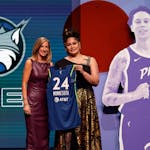PARK CITY, UTAH – U.S. Olympic Committee CEO Scott Blackmun said Monday he supports the rights of athletes to express political opinions. But he noted that the Olympic Games prohibit political speech or protests of any kind, making it unlikely that American athletes would kneel during the playing of the national anthem during medal ceremonies at the upcoming Winter Olympics in Pyeongchang, South Korea.
Blackmun, speaking at the Team USA Media Summit, was emphatic that the USOC will not muzzle its athletes. He also said that one of the most famous political protests ever at a sporting event — by American sprinters John Carlos and Tommie Smith at the 1968 Olympics in Mexico City — was "a seminal moment'' for the Olympic movement, and for the U.S. Olympic team.
Smith, the gold medalist in the 200 meters, and Carlos, the bronze medalist, were shunned for years after raising their black-gloved fists on the podium. They have since been embraced by the USOC; last year, they were invited to accompany the 2016 Olympic team on its visit to the White House, and they are working with the group on diversity initiatives.
Chapter 5 of the Olympic Charter states that "No kind of demonstration or political, religious or racial propaganda is permitted in any Olympic sites, venues or other areas."
"I think the athletes you see protesting are protesting because they love their country, not because they don't,'' Blackmun said. "So we fully support the right of our athletes and everyone else to express themselves.
"With the Olympic Games themselves, there is a prohibition on all forms of demonstrations, political or otherwise. And that applies no matter what side of the issue you're taking, no matter where you're from. So we have a little bit different state of play when it comes to the Olympic Games. But I think our stance on this has been fairly clear.''
Athletes at the Media Summit on Monday addressed the controversy carefully. Skier Julia Mancuso said she admires athletes who stand up for their beliefs, but she views the situation as different for Olympic athletes, because the Games are held just once every four years.
"For me, one of the proudest parts of being an American is the ability to have freedom of speech,'' said Mancuso, a three-time Olympic medalist. "And I really look up to athletes who take a stand for what they believe in.
"I really believe as athletes that compete for Team USA, when it comes to the Olympics, it's a special event. It's not like the NFL or pro sports teams that compete every weekend. For us, it's every four years. I'm proud for athletes that stand up for what they believe in if they really want to have a message they give out, but I also like to think of us all as very patriotic, and athletes that just are really proud to be representing Team USA at the Olympics.''
Two college players who are candidates to make the Olympic men's hockey team — Wild prospect Jordan Greenway of Boston University and Troy Terry of Denver — said they won't be engaging in protests during the anthem.
"I've always stood for the national anthem and always will," Greenway said. "I'm really focused on making the Olympic team. I'm not too focused on what's going on politically."
Terry echoed that stance. "I definitely think (protesters) are entitled to their opinions and can express how they feel,'' he said. "But you won't see me taking a knee at the national anthem, especially at an event like the Olympics."
Mike Tirico, who will take over for Bob Costas as host of NBC's prime-time Olympic coverage, speculated that Olympic athletes may have a much different perspective than NFL players on using the national anthem as a backdrop for making a statement.
To them, the anthem isn't just part of pregame tradition. It represents Olympic success, as well as the patriotism that is the lifeblood of the Games.
"It will be interesting to see, now that it's on the radar of every athlete, if anybody goes down that road (in Pyeongchang)," he said. "I get the sense that playing for Team USA, and representing the United States of America, puts these athletes in a different spot than the left tackle for the Philadelphia Eagles."






